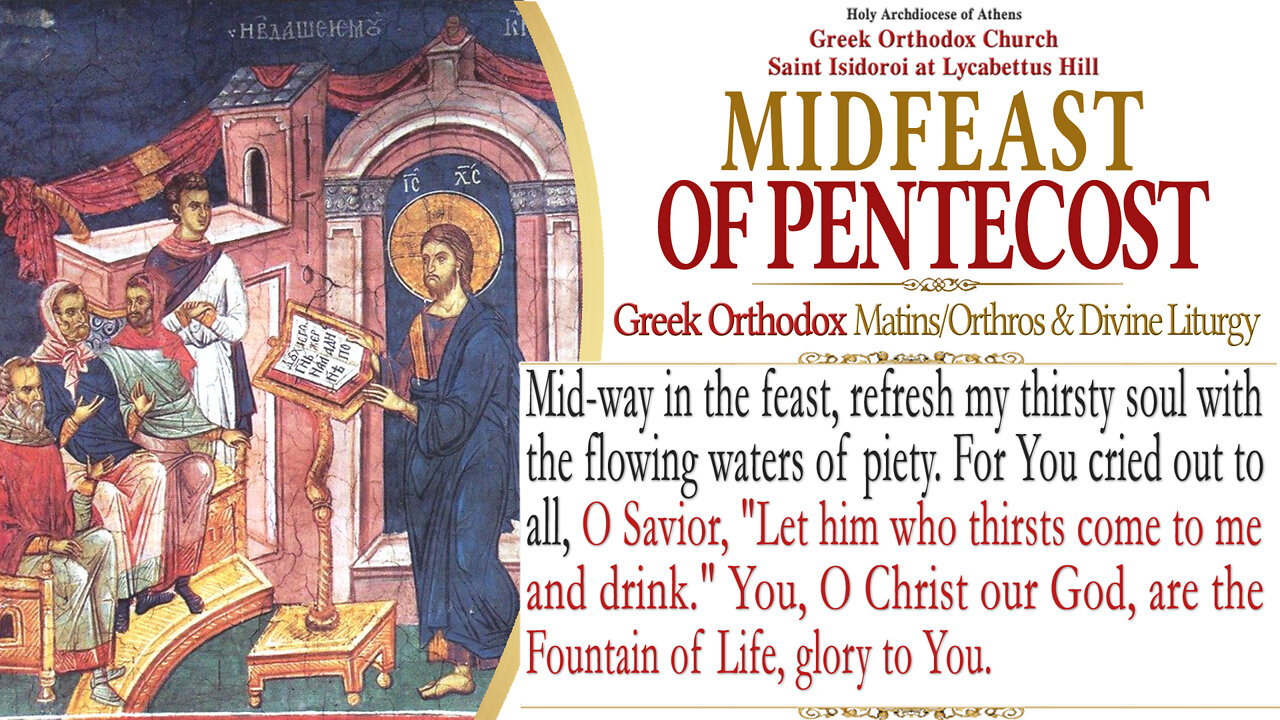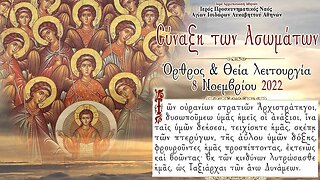Premium Only Content

May 18, 2022, Midfeast of Pentecost | Greek Orthodox Divine Liturgy
Watch live from the Greek Orthodox Church of Saint Isidoroi at Lycabettus Hill, the Matins/Orthros and the Divine Liturgy.
Today’s celebration is the midpoint of the fifty days between the Feasts of Pascha and Pentecost. Saint John tells us (John 7:14) that “in the midst of the feast Jesus went up into the Temple, and taught.” The Feast in question is the Feast of Tabernacles (celebrated in September), not Pentecost. The Church has appointed John 7:14-30 to be read for the Midfeast, thereby linking Pascha and Pentecost. In Chapter 8 of Saint John’s Gospel, the Lord came to the Temple again and taught the people who came to Him. After leaving the Temple, he encounters the man born blind. We will hear about him on the Sunday of the Blind Man. The Troparion of the Midfeast (“In the middle of the Feast, O Savior, fill my thirsting soul with the waters of godliness, as Thou didst cry to all: If anyone thirst, let him come to Me and drink [John 7:37]. O Christ God, Fountain of our life, glory to Thee!”) hints at the encounter of Christ and the Samaritan Woman in just a few days.
Apolytikion of Mid-Pentecost
Mid-way in the feast, refresh my thirsty soul with the flowing waters of piety. For You cried out to all, O Savior, "Let him who thirsts come to me and drink." You, O Christ our God, are the Fountain of Life, glory to You.
Kontakion of Mid-Pentecost
O sovereign Master and Creator of all things, O Christ our God, Thou didst cry unto those present at the Judaic Mid-feast and address them thus: Come and draw the water of immortality freely. Wherefore, we fall down before Thee and faithfully cry out: Grant Thy compassions unto us, O Lord, for Thou are truly the Wellspring of life for all.
The small church of Saint Isidoroi belongs to the Holy Archdiocese of Athens and is located on the west side of Lycabettus Hill in Athens, built inside the largest cave on the hill. According to tradition, this cave was a place of ascetic life of the Christians of the first centuries.
-
 2:50:43
2:50:43
Greek Orthodox Church St. Isidoroi, Athens, Greece
2 years agoNovember 8, 2022, Synaxis of the Bodiless Powers | Greek Orthodox Divine Liturgy
146 -
 LIVE
LIVE
StoneMountain64
5 hours agoBATTLEFIELD 6 BETA Training and Prepping
314 watching -
 1:14:11
1:14:11
vivafrei
4 hours agoAcosta AI Interview: Journalism or Exploitation? The War of the Jeans! Cincinnati Update & MORE!
80.9K20 -
 1:18:26
1:18:26
The White House
5 hours agoPresident Trump Signs an Executive Order, August 05, 2025
20.5K20 -
 3:01:50
3:01:50
The Illusion of Consensus
5 days agoDave Smith & Rav Arora REACT To Douglas Murray x Sam Harris Podcast On Misinformation & "Expertise"
16.4K7 -
 2:00:46
2:00:46
The Quartering
4 hours agoClintons To Testify, Zoo Asks For Peoples Pets For Food, Young Voters, GTA To Require ID To Play
95.8K34 -
 1:15:15
1:15:15
Awaken With JP
4 hours agoArrest Warrants for Dems, MSNBC Sucks, and More - LIES Ep 103
46.2K40 -
 1:23:58
1:23:58
The HotSeat
2 hours agoIf I Were The Devil: Part I
12.3K9 -
 59:04
59:04
The Tom Renz Show
3 hours agoBurn Bags - Epstein Story is Back On Top (No Pun Intended)
7.41K3 -
![[Ep 721] DOJ: Grand Jury on Russiagate | Rogue TX Dems - FAFO | Sam Anthony – [your]NEWS](https://1a-1791.com/video/fww1/39/s8/1/u/i/K/8/uiK8y.0kob.1-small-Ep-721-DOJ-Grand-Jury-on-Ru.jpg) LIVE
LIVE
The Nunn Report - w/ Dan Nunn
3 hours ago[Ep 721] DOJ: Grand Jury on Russiagate | Rogue TX Dems - FAFO | Sam Anthony – [your]NEWS
65 watching